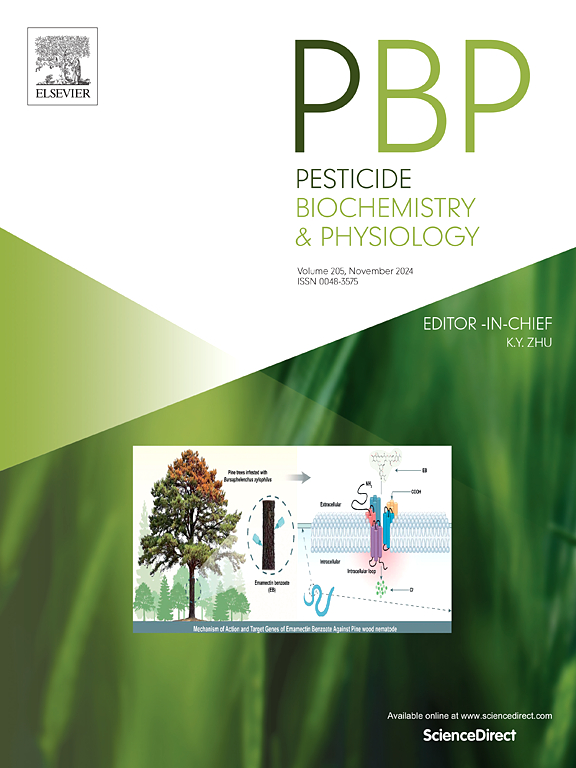A UDP-glucuronosyltransferase gene UGT379A1 involved in detoxification of lufenuron in Diaphorina citri
IF 4.2
1区 农林科学
Q2 BIOCHEMISTRY & MOLECULAR BIOLOGY
引用次数: 0
Abstract
The Asian citrus psyllid, Diaphorina citri Kuwayama (Hemiptera: Psyllidae), is a devastating bacterial disease of commercial citrus. Presently, uridine diphosphate (UDP)-glycosyltransferases (UGTs), have been linked to the detoxification of pesticides, were known as phase II enzymes in the detoxification process. However, the role of UGTs in detoxification of lufenuron in Diaphorina citri is unknown. In this study, we identified a UGT gene, UGT379A1, which was significantly up-regulated under the exposure of lufenuron. The knockdown of UGT379A1 increased the susceptibility of D. citri to lufenuron. In vitro metabolism and Dixon plot analysis indicated that UGT379A1 could deplete lufenuron by sequestration. These results showed that UGT379A1 was involved in the lufenuron detoxification, which provides a theoretical basis for the prevention and control of D. citri.

求助全文
约1分钟内获得全文
求助全文
来源期刊
CiteScore
7.00
自引率
8.50%
发文量
238
审稿时长
4.2 months
期刊介绍:
Pesticide Biochemistry and Physiology publishes original scientific articles pertaining to the mode of action of plant protection agents such as insecticides, fungicides, herbicides, and similar compounds, including nonlethal pest control agents, biosynthesis of pheromones, hormones, and plant resistance agents. Manuscripts may include a biochemical, physiological, or molecular study for an understanding of comparative toxicology or selective toxicity of both target and nontarget organisms. Particular interest will be given to studies on the molecular biology of pest control, toxicology, and pesticide resistance.
Research Areas Emphasized Include the Biochemistry and Physiology of:
• Comparative toxicity
• Mode of action
• Pathophysiology
• Plant growth regulators
• Resistance
• Other effects of pesticides on both parasites and hosts.

 求助内容:
求助内容: 应助结果提醒方式:
应助结果提醒方式:


